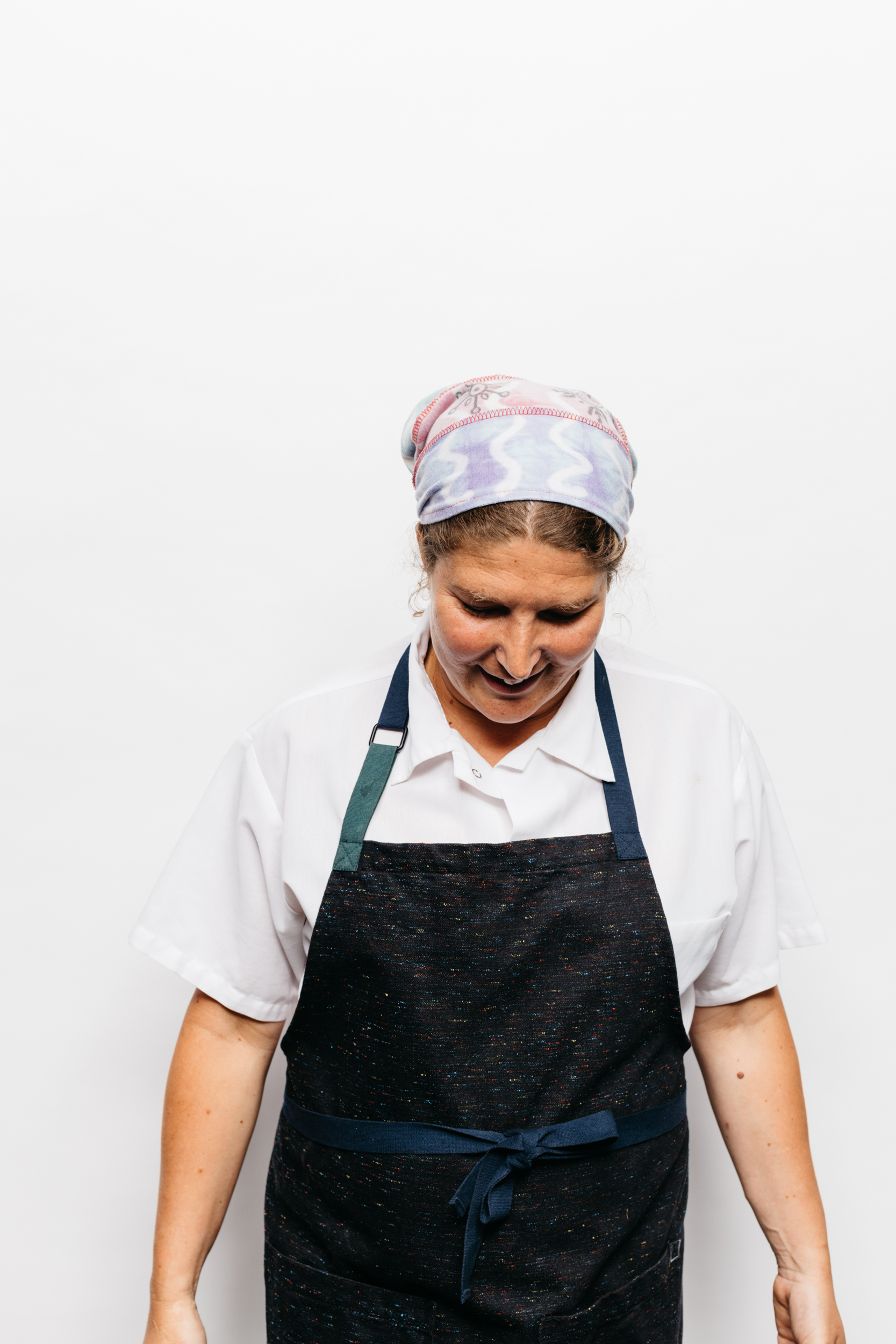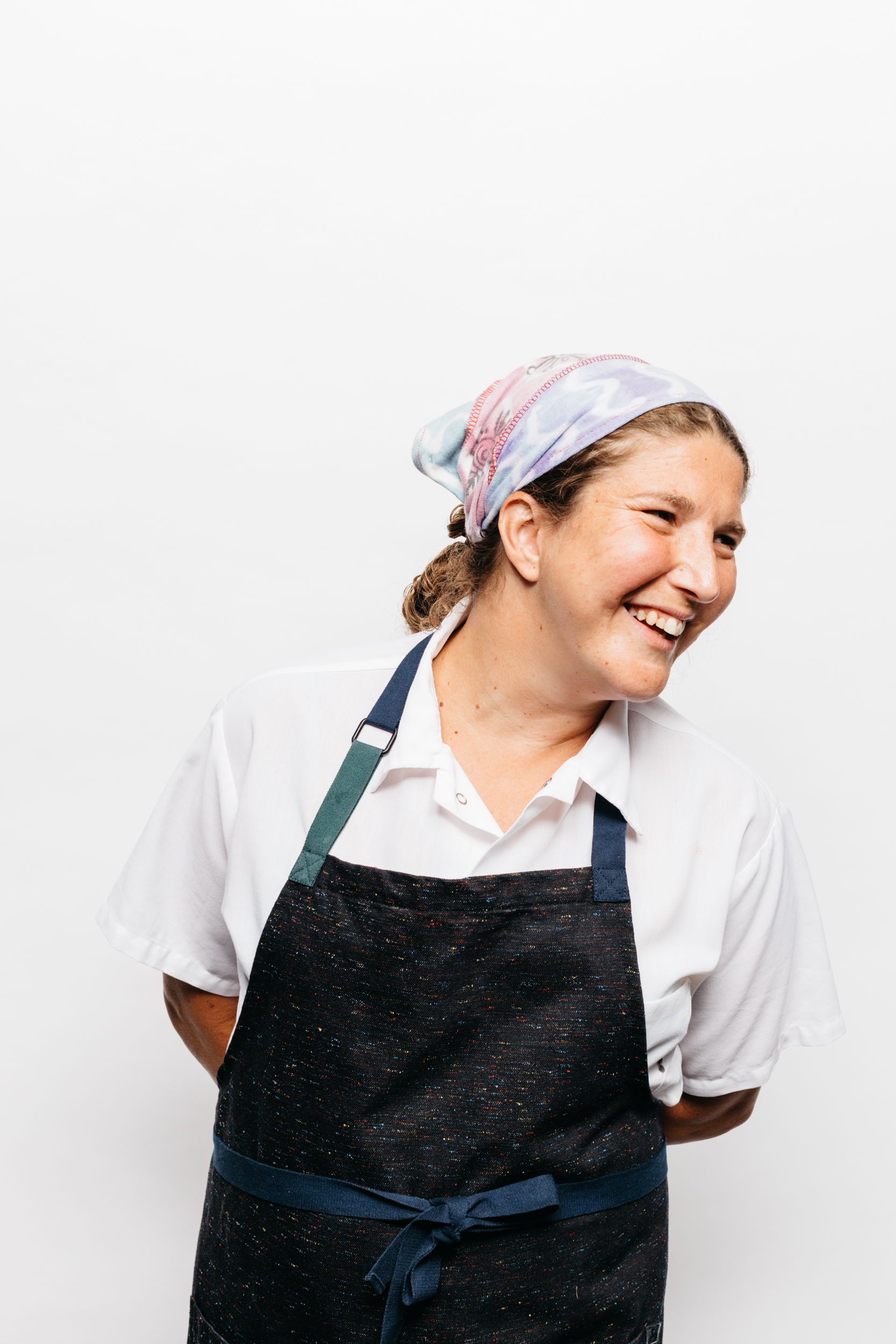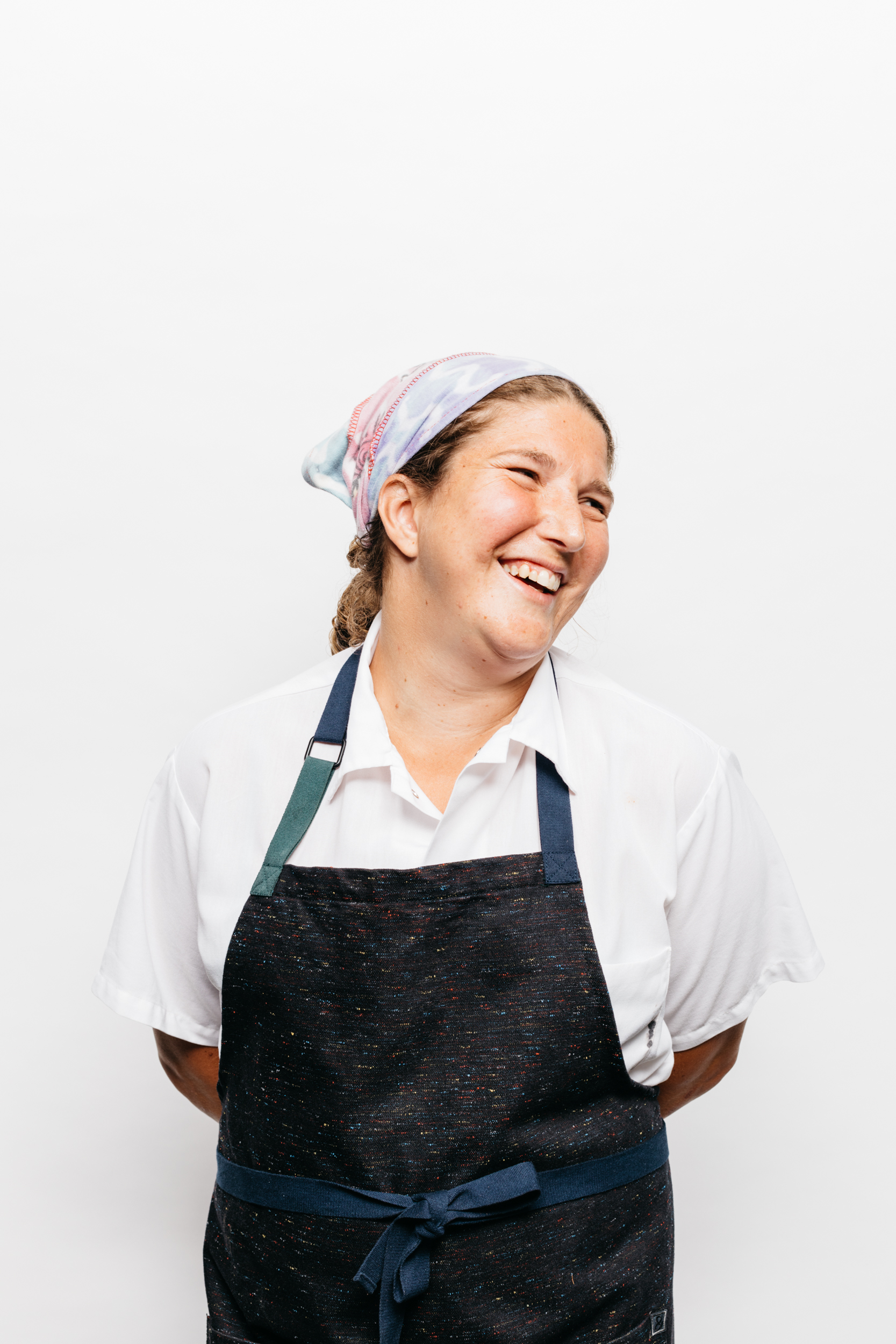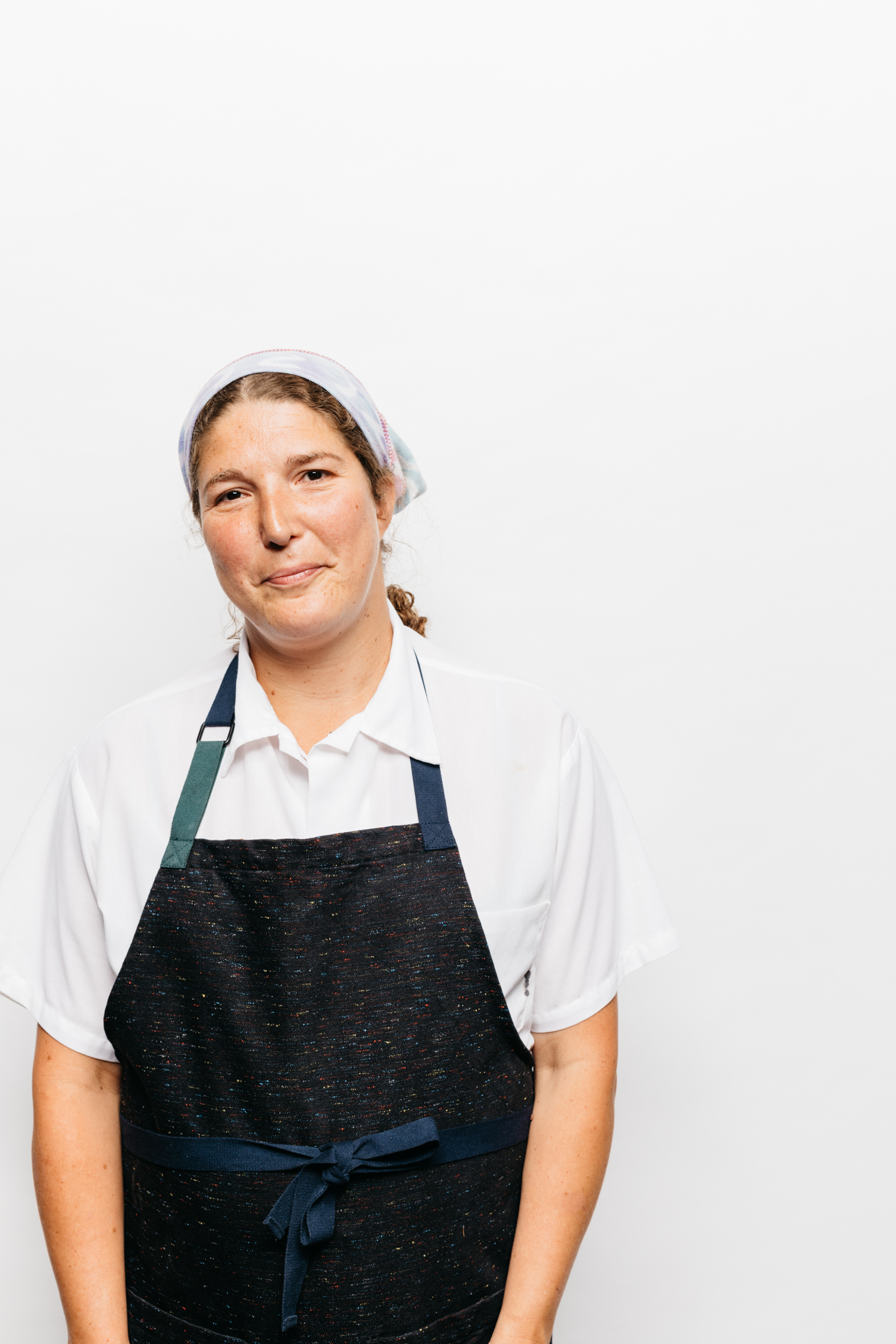Q+A: Cassie Piuma of Sarma
Photo by Michael Piazza
Cassie Piuma has worked alongside some of Boston finest culinary figures, though some might say in their shadow. But since opening Sarma in 2013 with Ana Sortun, a James Beard Award winner and the owner of Oleana, the spotlight now follows Piuma.
The self-effacing 37-year-old chef, who herself has been a James Beard Award finalist three times, may have honed her skills in Sortun’s kitchen, but thanks to her Greek heritage it was in her childhood kitchen that her interest in Middle Eastern food was born.
Sarma is located in a residential section of Somerville, which Piuma describes as a “vibrant neighborhood [with] a lot of families and people with kids.”
When I arrived on one of the hottest days of the summer the humidity was weighing heavy in the air, yet a nonplussed Piuma greeted me as I sat at one of her tables. She had barely been able to fit me into her schedule: “It’s been crazy …” she told me.
It was 4 o’clock in the afternoon and Piuma’s staff was preparing for a busy summer night. The restaurant seats 94, but on exceptional nights, Piuma said, they’ve been able to prepare almost 300 “covers.”
Despite her growing success, I was struck by Piuma’s hamish ways (think Yiddish!). I quickly felt at ease as her rich, deep voice carried the conversation above the humming vacuum cleaner, her voice’s clarity compensating for my hearing loss.
Piuma is the kind of person anyone would love to spend time with. Her gregarious nature and passion for people and food make it clear why her drive has been met with success.
Yet Piuma credits Sarma’s success to the personal and professional family that supports her. Her husband, Matthew, is the manager of Sarma and much of her staff has been with her since the restaurant opened five years ago. “We have this sort of camaraderie and this family that we’ve been able to develop over five years,” she said. “You accept changes and welcome new people to your team and each time you want to grow this family because without those guys you can’t make this work; it’s a team effort.”
This team effort is what’s put Sarma on the culinary map, and clearly Piuma cares as much about the food she creates as the people she shares it with.
Edible Boston: You have deep roots in New England, yet it is the cuisine of Turkey that has captured your interest. How did this happen?
Cassie Piuma: I’m half Greek and was exposed to a lot of the flavors I cook with growing up. I often joke that my body is made up of 50% feta cheese. However, it was not until I started working at Oleana and traveling extensively that my love affair with Middle Eastern cooking began.
EB: Sarma is said to serve seasonal dishes. Does that mean New England seasonal or what they would be serving in Istanbul in October?
New England seasonal.
EB: I am a tzatziki fan, yet I have never seen tzatziki that contains rose petals ... Are these traditional Turkish dishes or have you reinvented them in some way?
A little of both, depends on my mood. Sometimes I stay true to tradition while other times veering as far away as possible. Either way, I try to respect the fundamental flavor profiles that got my attention in the first place, so the food tastes exciting and modern, but authentic.
My goal with Sarma was always to strike a balance between the familiar and the unknown.
EB: Are their favorite dishes that return no matter the season? If so, which ones?
We have signature dishes that never leave the menu: Harissa BBQ duck, fava bean pâté, beef jerky, cauliflower fatteh and Brussels sprout bravas. Sesame fried chicken is a reoccurring special that people lose their minds over.
Then there are a few favorite dishes that return seasonally, including the Moroccan corn pancakes with salty date butter and sugar snap peas with pistachio, tahini and crispy quinoa.
EB: What will be some of the highlights on your fall menu?
I got super excited about these sweet little Honeynut squashes Siena Farms grew last year. I would love to stuff them with mushrooms and chestnuts for a vegetarian moussaka.
EB: With the many unusual ingredients in your dishes, can you find what you need in Boston? Are there special places you go? Where?
Oh, for sure! We get the majority of our Middle Eastern pantry items from Sevan Bakery in Watertown. Chafic Maalouf imports our olive oil from his family’s groves in Lebanon. Organic tahini from Philly-based Soom, spices from Christina’s in Cambridge and La Boîte in New York City. And most other stuff gets procured by our specialty foods purveyor or good old Amazon!
EB: What are the five spices you can’t live without and why?
Ugh, this is a tough question! I can’t even narrow it down to five; it has to be seven. However, I am able to rate them!
1. Coriander—bright and citrusy. The light of my cooking life. I essentially put it in everything from seafood to lentils.
2. Cumin—earthy and rich. Without it there would be no hummus (enough said).
3. Sumac—magical, lemony, purplish powder. We garnish most meze with this not-so-secret ingredient to give it that extra “Pop! Zing! Bang!”
4. Maras chiles—spicy with underlying sweetness and tremendous depth. I’m a spicy girl and you know what they say: “If you don’t like the heat …”
5. Smoked paprika—bittersweet, smoky, sexy. When chefs talk about layers of flavor, this is the spice that builds.
6. Dried mint—intensely herbal, almost medicinal. So different from its fresh counterpart. Makes Greek food taste Greek and brings me back to warm Santorini nights.
7. Saffron—floral, luxurious minerality. Saffron is a tough one, you can’t quite put your finger on the flavor, but things just aren’t the same without its warm, reddish-orange threads.
EB: If you were to start another restaurant, keeping Sarma in place, what country’s cuisine would you re-create and why?
I’d love to jump into the cuisine of Cyprus. It’s the intersection of my two loves—Greece and Turkey.
EB: You’ve worked alongside Ana Sortun, owner of Oleana. What is her connection to Sarma these days?
Ana [Sortun] is a business partner and mentor.
EB: Of all the places you’ve worked, which one—or which person—has influenced you the most as a chef?
The late George German (of Al Forno) was a teacher, father figure, inspiration and a true pioneer. I was fortunate to spend my formative years in his kitchen learning the difference between right and wrong and developing a respect not only for ingredients, but for the process.
And of course, Ana Sortun, queen of all things Middle East. Her passion and desire for learning is infectious, her generosity unparalleled.
EB: You have received numerous awards (how many, or have you lost count?). You’ve been a James Beard finalist three times, which is an honor in itself, but which of your other awards has meant the most and why?
Not much tops those [James] Beard nominations—pretty mind blowing for a chef. They represent countless hours of hard work and determination and honor the contributions of each and every member of our staff.
EB: When people use the term “small plates,” they think “tapas.” What is the most outstanding difference between meze and tapas?
I think more important than the differences are the similarities. This style of eating is meant to encourage conversation and promote a more relaxed lifestyle. A celebration of the good things in life: food, drink and friendship.
EB: Sarma has a seating capacity of 100, yes? How would you describe the restaurant to me?
Ninety-four, to be exact. Sarma’s a big party: The energy is palpable, lots of laughter, music and the clatter of cocktails; a joyful collection of bright colors and textiles that remind us of the places we’ve been and the places we hope to go.
EB: You encourage your patrons to sit, share, sip, pair wines with dishes, listen to music … It sounds like Sarma is where you want to spend an entire evening, yet your prices are reasonable. How do you make it all work? How much time should you give yourself for the full Sarma experience?
We have a wonderful, dedicated and experienced team of managers, servers and support staff who embody hospitality. They can navigate the menu like brain surgeons and know how to provide a personalized experience for each and every guest, including budgetary and time restrictions.
EB: Can you briefly describe your background? Growing up, was there a cook or chef in the family? A favorite dish of yours?
I grew up on the south shore in Duxbury, where the oysters come from. My mom was a flight attendant so we had the good fortune of traveling a lot as a family and got exposed to restaurants at an early age. One of my favorite childhood memories is my sister and I hovered over a bowl of escargots drowning in garlic butter. My dad taught me to make avgolemono, the Greek egg and lemon soup, which would likely be my last meal on earth.
EB: Running a restaurant is an all-consuming affair. How do you manage it with a husband and two children?
We have two daughters; Fiona (Fifi) is 3 and Talulav (Lulu) is 20 months.
Manage? Ice cold espresso shots. Two, every morning first thing, no exception. From the moment I wake up, my goal is to take control of the day. I’ve always been good at self-motivation and pushing myself. You need to keep your eye on the prize. And some days, that’s just your bed at the end of the night.
My husband and I have a good system. It’s not always pretty—in fact, sometimes it’s downright messy—but we make it work. We tackle challenges as a team, support each other unconditionally and try not to sweat the small stuff.
EB: You met your husband at Johnson & Wales University in Providence. Did you both major in the same concentration … and what was that? Has it proven helpful in your current career?
We both studied culinary arts at Johnson & Wales and worked in the industry as chefs for 15 years, however, when the time came to open Sarma we felt it best to divide and conquer. I took the back of the house; he took the front. Matt’s knowledge and understanding of kitchen logistics is extremely helpful. Not only is he our resident health inspector, but a sounding board for ideas and a brutally honest counterpoint.
EB: If you were to order for me, what dishes would you order?
Fava bean pâté, cauliflower fatteh, basturma-wrapped trout and Circassian quail.
EB: Because I am blind, I always ask the people I interview to describe themselves to me. So, how would you describe yourself?
Usually when I am working, I have on a chef coat, which is a lot dirtier than it should be for this time of day (it was 4pm). I get messy very easily so I do a lot of wardrobe changes through the course of the night. I change my chef coat, like, three times.
I like really colorful leggings. There’s not a lot of room for fashion [in the kitchen] so you’ve got to get your colors and your fun in where you can! I usually wear fun socks [her current pair was adorned with palm trees and sunsets]. I wear black Birkenstock clogs … they’re the same ones I’ve been wearing for 20 years—not literally the same pair, but the same style. When you are on your feet all day you’ve got to wear what works. My hair is brown, I have enough hair for four people and have to tie it back, put it in a double knot. I should be wearing glasses. I’ve finally realized at this point in my life I need them.
I am kind, goal oriented, particular. Someone recently summed it up for me quite well: I either have a ton of patience or none at all.
sarmarestaurant.com
This story appeared in the Fall 2018 issue.

















